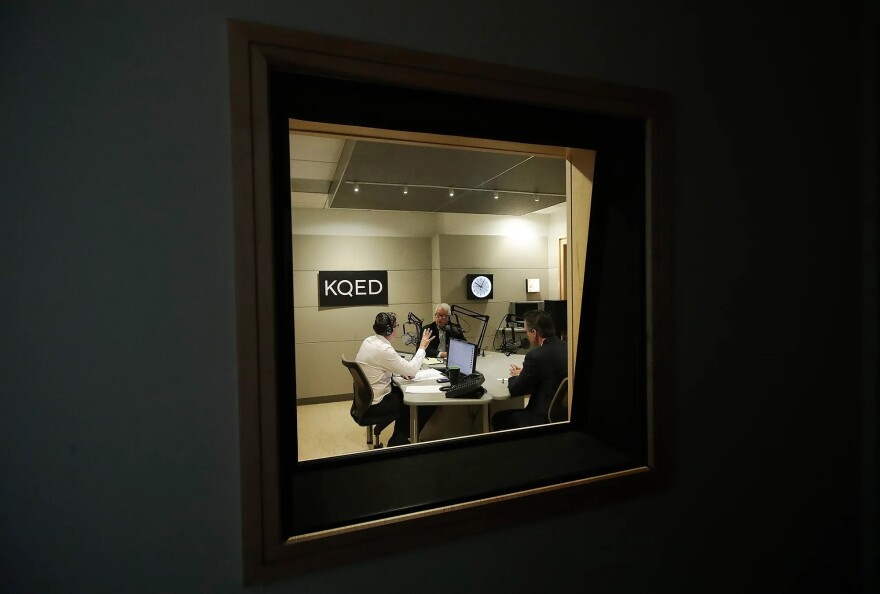Dozens of California public broadcasting stations will lose millions of dollars in funding after Republicans in Congress voted to strip them of federal funding, cutting off a vital lifeline in rural communities and limiting access to local news programming in an era of hyperpartisan national media.
While California broadcasters are assuring audiences that they plan to keep their signals running, they also warn that cost-saving changes are inevitable.
Radio and television stations of all sizes across the Golden State say that to survive, they’ll likely be forced to lay off staff and cut programming unless they’re able to make up the losses through fundraising. Their leaders warn that the cuts will disproportionately harm locally produced programs, the most expensive to create but among their most popular content, that inform millions of listeners and viewers.
Republicans have long wanted to cut funding for public broadcasting, arguing such services should be funded by private donors, not taxpayers. Their efforts prevailed when Congress last week finalized President Donald Trump’s request to rescind $1.1 billion from the Corporation for Public Broadcasting, which provides grants to National Public Radio, the Public Broadcasting Service, their affiliates and other independent public media creators. All nine of California’s Republican members of Congress voted in favor of the funding cuts.
Now, roughly 35 stations from San Diego to Hoopa in Humboldt County have lost critical funding.
While many public broadcasters remain hopeful that they’ll find ways to endure, all agree the rescission undermines the egalitarian mission of public media – to create a nationwide network that provides access to quality information, stories and music for local communities.
“That has been our superpower,” said Joe Moore, president and general manager of KVPR Valley Public Radio in Fresno. His station lost about 7% of its budget, or $175,000, from the CPB.
“The New York Times doesn’t have the type of investment in Alaska or in North Dakota – or on tribal reservations, bringing local news from these communities – that public radio does.”
Smaller stations whose budgets relied heavily on federal dollars to make ends meet are the most at risk of closure. In Eureka, the community-owned PBS affiliate KEET-TV stands to lose $847,000 – nearly half of its operating budget – due to the defunding of CPB. To survive, all of its funding will need to come from community support, since the station has no institutional backer such as a local college or school district.
David Gordon, KEET’s general manager and executive director, says that as much as he hopes the station will stay afloat even at reduced capacity, he won’t make the same bold proclamation that, “We’re not going anywhere,” like some stations have.
“I can’t guarantee that KEET will be here once the dust settles from this defunding move,” Gordon said. He emphasized that he was speaking for himself and not on behalf of his station.
“I hope it is, and I think there’s a good chance that it’ll survive in some form. But absolutely will it? I don’t know if I can say that.”
Nearby, Mendocino-based NPR member station KZYX was forced to lay off its news director after losing 25% of its operating budget, or $174,000, from the CPB. That means news will include fewer in-depth stories, such as interviews with city council members or county supervisors, said Andre de Channes, KZYX’s general manager and director of operations.
“There isn’t the time to source out those kinds of things,” he said. “So the news gets more like a headline news.”
The station serves roughly 130,000 listeners, including in Mendocino County and part of Lake County. When de Channes first learned about the CPB cuts, he immediately worried about fire safety, since listeners who live in off-the-grid rural areas without access to internet or cell service rely on KZYX for emergency information.
Those potentially lifesaving emergency alerts became a rallying cry for public media providers and their allies as they begged Congress to preserve funding for their stations, especially those in remote, rural areas that also tend to be Republican. Frank Lanzone, the longtime general manager of the NPR-affiliated KCBX in San Luis Obispo, said his station has sometimes been the only on-air source providing emergency information during severe weather events.
“There’s been several times in very bad storms when we’re the only station on the air in our area because of either power outages or people’s generators ran out of propane,” said Lanzone, who has worked in public radio for more than 50 years.
KCBX, which serves about 45,000 listeners from Santa Barbara to Monterey, will lose $240,000 in funding from CPB, about 13% of its operating budget.
“It’s going to hurt the stations and the people that listen to them who need it the most,” Lanzone said. “The most vulnerable, the ones out in the middle of nowhere.”
Local programs are most at risk
Both radio and television station leaders emphasized that local programming – shows that are created and produced in-house rather than purchased from another producer – will be first on the chopping block. To produce locally focused public television programming, stations must invest additional time, money and work on top of the membership dues they pay to be affiliated with PBS, which unlocks a large catalogue of programming that they can air at no additional cost.
For PBS viewers in the Inland Empire, that likely means the loss of popular local programs such as “Inland Edition,” an Emmy-winning weekly half-hour public affairs show, and “Learn With Me,” an award-winning bilingual English-Spanish children’s show, both of which are produced in house by affiliate KVCR.
“The local stuff that’s so important to people is probably the stuff that’ll go away,” said Connie Leyva, executive director of KVCR and a former Democratic state senator. The station stands to lose about $550,000 in annual CPB funding, about 6% of its budget.
She emphasized that the station also wanted to preserve its journalism staff – two full-time reporters and one part-time – who have recently focused on federal immigration raids taking place across the region.
“If we’re not here, the Inland Empire is just hearing about what’s happening in Los Angeles,” Leyva said. “We want to know what’s happening in our backyard, what’s happening at the schools around us, what’s happening at the Home Depots around us.”

Large stations and independents suffer too
While larger radio stations such as KQED in San Francisco are better equipped than their smaller counterparts to withstand the blow to their budgets, they too will lose massive chunks of funding that currently fund journalist positions and popular shows. Tony Marcano, who runs a statewide partnership network of 14 public radio stations and CalMatters known as the California Newsroom, said the loss of public funding will require even more collaboration.
“Smaller stations are likely to be more affected, but that doesn’t mean that the large stations are out of the woods,” Marcano said. “There’ll be pain.”
KQED, one of the country’s most listened-to public radio stations and the largest in California, laid off 45 employees earlier this month and lost 10 more from early retirement offers. The 15% reduction came on the eve of Congress passing the budget cuts and is KQED’s third round of layoffs in just five years. Though the station stressed that the cuts were due to longstanding financial challenges, KQED now stands to lose close to $8 million, or about 8% of its revenue.
LAist, the Los Angeles area’s largest NPR affiliate, laid off eight people earlier this year and has slashed 61 positions since 2023. It will lose $1.7 million in federal funding, about 4% of its budget.
The consequences go beyond newsroom staff and programming. The federal government funds repairs to transmission infrastructure and played a role in helping negotiate artist royalty fees on behalf of local stations.
Radio Bilingüe, a Central Valley-based organization that is one of the largest Spanish-language radio outlets and broadcasts throughout the U.S. and Mexico, was in the final stages of negotiations for a $1.1 million grant from the CPB to improve its transmission equipment, which hasn’t been updated since the 1980s. But the funding rollback means it will have to find the money elsewhere, said Hugo Morales, the group’s co-executive director and founder.
“You’re talking about transmitters that are 40 years old,” Morales said. “At some point, it’s going to give out, and we’re going to have to find somewhere else to raise the money for that.”
Morales also made the difficult decision earlier this year to cancel the construction of three additional stations across Arizona and New Mexico that would have primarily served rural communities and farm workers who don’t have access to broadband. The organization and its stations will lose $300,000 in annual CPB grants, roughly 7.5% of its yearly budget.
During the COVID-19 pandemic, Radio Bilingüe shared vital information about testing centers, vaccine availability and how to sign up for social services in Spanish and Indigenous languages such as Mixteco and Triqui.
The loss of CPB funding will also jeopardize independent documentary filmmakers supported by the San Francisco-based ITVS, which Congress created in 1990 as an independent service with a mandate to increase diversity and innovation in public media. It received roughly 86% of its budget, $19 million, from federal grants.
ITVS leaders say the group has partnered with hundreds of independent filmmakers to co-produce more than 900 feature documentaries distributed to PBS stations nationwide.
“Public media is a space for all Americans,” said Carrie Lozano, the organization’s president and CEO. “These films are not partisan. They are, generally speaking, films that touch everybody’s lives. They are there in service of the public.”
In anticipation of the cuts, the organization laid off 13 employees in June, or roughly 20% of its staff. Lozano expects roughly 10 films to lose out on funding this year – a big cut from the 20 to 40 feature and short documentaries that ITVS typically funds every year. While the organization is determined to stay afloat, Lozano worries the loss of federal investment will prevent important stories from being told and create a domino effect on the rest of the ecosystem.
“There’s no question that this is a huge blow to the field,” Lozano said, “and to everything that surrounds it.”



